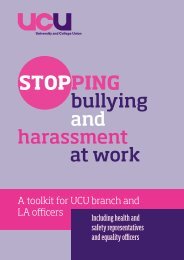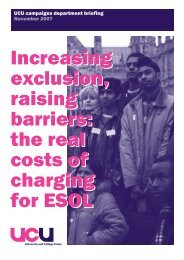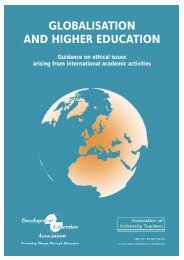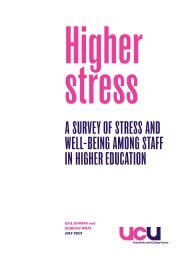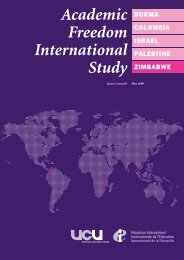Jobs and education - UCU
Jobs and education - UCU
Jobs and education - UCU
Create successful ePaper yourself
Turn your PDF publications into a flip-book with our unique Google optimized e-Paper software.
<strong>Jobs</strong> <strong>and</strong> <strong>education</strong><br />
regaining the trust of young people
<strong>Jobs</strong> <strong>and</strong> <strong>education</strong><br />
<strong>Jobs</strong> <strong>and</strong><br />
<strong>education</strong><br />
regaining the trust of young people<br />
This pamphlet began as a paper<br />
presented by NEC member Sean<br />
Vernell to <strong>UCU</strong>'s Further Education<br />
Committee. The committee adopted<br />
it as a campaigning tool to help defend<br />
further <strong>and</strong> adult <strong>education</strong> in the<br />
face of the growing crisis in post-16<br />
<strong>education</strong> <strong>and</strong> as a response to the<br />
riots by young people in August 2011.<br />
Contents<br />
Introduction 3<br />
<strong>Jobs</strong>: the bedrock of security 5<br />
A diverse curriculum 8<br />
Funding 10<br />
The market <strong>and</strong> competition 12<br />
Colleges for the community 14<br />
Respecting the teacher 14<br />
Campaigning suggestions 15<br />
2
Regaining the trust of young people<br />
Introduction<br />
<strong>UCU</strong> has always<br />
argued that if<br />
further <strong>and</strong> adult<br />
<strong>education</strong> is to<br />
continue to play<br />
the vital role it has<br />
done in the past,<br />
then it needs to<br />
be properly<br />
funded.<br />
Further <strong>and</strong> adult <strong>education</strong> has always played a central role<br />
in giving a second chance to young adults who may not have<br />
achieved as much as they would have liked at school. Every<br />
so often events occur that underline the importance <strong>and</strong><br />
significance of the sector to achieving social cohesion <strong>and</strong><br />
providing hope for some of the most disadvantaged in our<br />
society. Following the 1981 riots significant sums of government<br />
spending were channelled into YTS, YOPS <strong>and</strong> other<br />
training schemes, often of dubious value. There was also<br />
an increase in the funding of further <strong>and</strong> adult <strong>education</strong>.<br />
Alongside this increase we saw an acceleration of the shifting<br />
of the sector from one based primarily on training <strong>and</strong> skills<br />
for local employers, to one where values of general <strong>education</strong>,<br />
encompassing both vocational <strong>and</strong> academic elements,<br />
coexisted. As a result of this, there was an increase in<br />
access to further <strong>and</strong> higher <strong>education</strong> by young people who<br />
had not previously seen tertiary <strong>education</strong> as a path to<br />
developing their abilities.<br />
<strong>UCU</strong> has consistently argued that if further <strong>and</strong> adult<br />
<strong>education</strong> is to continue to play the vital role it has done in<br />
the past, then it needs to be properly funded. Its <strong>education</strong>al<br />
role cannot be driven by a narrow vocationalism.<br />
For those who work in further <strong>and</strong> adult <strong>education</strong> the civil<br />
unrest that erupted onto our streets in August 2011 was<br />
predictable. The abolition of the <strong>education</strong> maintenance<br />
allowance (EMA) <strong>and</strong> the raising of university fees confirmed<br />
the sense felt by many young people that the government<br />
had written off their futures. For many of our young adults<br />
there is a deep sense of anger, frustration <strong>and</strong> fear about<br />
their futures. This, in turn, has led some to feel alienated<br />
3
<strong>Jobs</strong> <strong>and</strong> <strong>education</strong><br />
For those who work<br />
in further <strong>and</strong> adult<br />
<strong>education</strong> the civil<br />
unrest that erupted<br />
onto our streets in<br />
August 2011 was<br />
predictable.<br />
<strong>and</strong> distrustful of a society that fails to provide space for their<br />
concerns to be listened to <strong>and</strong> does not make them feel<br />
secure. Furthermore, the cuts in teaching <strong>and</strong> course provision<br />
will accelerate the drive towards elitism in <strong>education</strong>,<br />
which will cascade throughout 14–19 <strong>education</strong> resulting<br />
in the narrowing <strong>and</strong> stratification of the curriculum offer.<br />
The government’s response was as predictable as the<br />
reaction of those young people to their feelings of insecurity.<br />
All the old dogmas of ‘criminal classes’, ‘parental discipline’,<br />
‘greed’, ‘feral underclass’ <strong>and</strong> ‘lack of values’ were used<br />
alongside mass arrests <strong>and</strong> imprisonment to regain order.<br />
These kinds of explanations <strong>and</strong> resorting to tactics which<br />
create fear will only deepen the sense of alienation that<br />
many young people feel.<br />
We in <strong>UCU</strong> believe that the riots should be wake-up call to<br />
all those who work <strong>and</strong> run <strong>education</strong> services in Britain. As<br />
<strong>education</strong>alists, we believe that further <strong>and</strong> adult <strong>education</strong><br />
can play an essential part in helping win back the trust <strong>and</strong><br />
respect of young people. However, for this to happen there<br />
must be an urgent reassessment of the role of further <strong>and</strong><br />
adult <strong>education</strong> <strong>and</strong> how it is funded.<br />
4
Regaining the trust of young people<br />
The job creation<br />
schemes that the<br />
government has<br />
put forward seem<br />
to have learnt very<br />
little from the<br />
disastrous YOP<br />
schemes of the<br />
1980s.<br />
<strong>Jobs</strong>: the bedrock of security<br />
The government’s recent announcement to invest £1bn over<br />
a three-year period into creating training for 16-24-year-olds<br />
was a response to the riots that took place in the summer.<br />
Although the extra funding is welcome, it is far too little to<br />
resolve the national sc<strong>and</strong>al of 1.02 million unemployed<br />
young people. It amounts to only just over £330 million per<br />
year. The money is not new money, it’s taken from the working<br />
family tax credits which will be frozen for the next three<br />
years. By giving a small amount to young people on the one<br />
h<strong>and</strong> they are simultaneously hitting them, <strong>and</strong> their families,<br />
even harder on the other.<br />
The job creation schemes that the government has put<br />
forward seem to have learnt very little from the disastrous<br />
YOP schemes of the 1980s. As the BBC reported Brendon<br />
Barber, the general secretary of the TUC, say:<br />
There are already widespread reports of young people on<br />
the programme being exploited. Keen unemployed youngsters<br />
desperate to find work shouldn’t be conscripted into edging<br />
out other workers who should have been paid the going rate<br />
for the job.<br />
In the foreword written by Michael Gove, Secretary of State<br />
for Education, to Professor Alison Wolf’s report into further<br />
<strong>and</strong> adult <strong>education</strong>, he states:<br />
We already know what good looks like. Apprenticeships at<br />
BT or Rolls-Royce are more oversubscribed than the most<br />
desirable course at the best university. These types of courses<br />
offer a route to good salaries <strong>and</strong> quick promotion at worldbeating<br />
firms. What’s more, many of the best courses – like<br />
those offered by BT – hold open the door for further study in<br />
higher <strong>education</strong>.<br />
It is good to see that the Secretary of State has discovered<br />
vocational <strong>education</strong> <strong>and</strong> the importance of apprenticeships.<br />
5
<strong>Jobs</strong> <strong>and</strong> <strong>education</strong><br />
The problem is the government are not implementing policies<br />
that will create jobs or apprenticeships. In fact they are cutting<br />
budgets <strong>and</strong> presiding over another economic downturn<br />
that has already raised youth unemployment to one million.<br />
One in five 16–24-year-olds are without work or <strong>education</strong>.<br />
Fifty percent of young black men are unemployed. As one of<br />
the heads of the IMF recently stated:<br />
It’s probably too much to say that it’s a jobless recovery, but<br />
it is certainly a recovery with not enough jobs. Especially<br />
because of youth unemployment... There is now a risk that<br />
this will be turned into a life sentence, <strong>and</strong> that there is a<br />
possibility of a lost generation.<br />
Over the past<br />
30 years, youth<br />
unemployment<br />
has become<br />
institutionalised;<br />
now only a<br />
minority of 16-25<br />
year olds are in<br />
the workforce.<br />
Indeed young people have taken the brunt of the economic<br />
crisis (although the notion that there has been a recovery<br />
seems rather far fetched). Over the past 30 years, youth<br />
unemployment has become institutionalised; now only a<br />
minority of 16-25 year olds are in the workforce. This was not<br />
always the case. From the end of the Second World War to the<br />
end of the 1960s unemployment rates among young people<br />
were lower than those in the working population as a whole.<br />
One million climate jobs<br />
<strong>UCU</strong> believes the government must act immediately to create<br />
real jobs <strong>and</strong> apprenticeships for young people. We have a<br />
global economic crisis <strong>and</strong> a global environmental crisis.<br />
Finding a solution to the climate crisis will help us to solve<br />
the economic one. That is why <strong>UCU</strong> supports the dem<strong>and</strong><br />
for one million climate jobs. We need jobs that deal with the<br />
impact of climate change as well as those that will prevent<br />
a further descent into global warming.<br />
The government’s strategy document Enabling the transition<br />
to a Green Economy (August, 2011) falls well short of what<br />
is required. There is no clear strategy for delivering green<br />
prosperity. At the heart of the problem is the view that an<br />
‘employer-led’ approach will deliver. The experience since the<br />
6
Regaining the trust of young people<br />
Finding a solution<br />
to the climate<br />
crisis will help<br />
us to solve the<br />
economic one.<br />
That is why <strong>UCU</strong><br />
supports the<br />
dem<strong>and</strong> for one<br />
million climate<br />
jobs.<br />
signing of the Kyoto Protocol in 1997 shows this is wishful<br />
thinking. The green skills gap is now a major stumbling block<br />
to delivering the transition to a low carbon economy. <strong>UCU</strong><br />
believes that an integrated skills strategy should cover:<br />
l<br />
l<br />
l<br />
l<br />
l<br />
l<br />
the effective embedding of Education for Sustainable<br />
Development across the curriculum<br />
the rapid introduction of a short-course sustainability skills<br />
programme to train the existing workforce<br />
an expansion of quality apprenticeships based on a<br />
coherent system of delivery<br />
addressing the inequalities in apprenticeships to ensure<br />
access by under-represented groups<br />
promoting effective community engagement by the further<br />
<strong>and</strong> adult <strong>education</strong> sector to support the supply <strong>and</strong><br />
dem<strong>and</strong> issues of skills <strong>and</strong> jobs<br />
ensuring that employers take the <strong>education</strong>al needs of<br />
their employees seriously. They should be given a statutory<br />
right to paid <strong>education</strong>al leave <strong>and</strong> to workplace training<br />
committees. Trade unions must be given negotiating rights<br />
for <strong>education</strong> <strong>and</strong> training.<br />
7
<strong>Jobs</strong> <strong>and</strong> <strong>education</strong><br />
A diverse curriculum<br />
The Wolf Report makes some valid points but it is too narrow<br />
in its approach <strong>and</strong> does not locate the root of the problem<br />
to succeed. If young adults are going to give <strong>education</strong> a second<br />
chance they have to believe that it is worth their while.<br />
To do this we have to create a different narrative of <strong>education</strong><br />
for young people. The narrow employer-driven entwining of<br />
<strong>education</strong> with employment has led many to become<br />
disillusioned with <strong>education</strong>. Especially when the skills they<br />
are learning are for non-existent jobs. They simply ask:<br />
‘what’s the point?’.<br />
The obsession<br />
with exams <strong>and</strong><br />
grades has forced<br />
students to follow<br />
narrowly-based<br />
criteria to pass<br />
exams at the<br />
expense of<br />
developing the<br />
ability to think<br />
critically <strong>and</strong> be<br />
creative.<br />
Students from working class <strong>and</strong> disadvantaged backgrounds<br />
have been taught to believe that courses only have a value<br />
if they are directly relevant to the particular needs of employment.<br />
Therefore, learning History or English literature, as an<br />
example, is seen as pointless. Successive governments have<br />
done a great deal of damage to our young people’s underst<strong>and</strong>ing<br />
of what <strong>education</strong> is by p<strong>and</strong>ering to the right wing<br />
populist newspapers’ bias towards what they see as ‘Mickey<br />
Mouse’ courses.<br />
There needs to be a fresh approach coming from government<br />
that disentangles <strong>education</strong> from employment. This requires<br />
8
Regaining the trust of young people<br />
There needs to be<br />
a fresh approach<br />
coming from<br />
government that<br />
disentangles<br />
<strong>education</strong> from<br />
employment.<br />
the creation of a vocational <strong>education</strong>al curriculum that<br />
includes apprenticeships. This involves creativity in problemsolving<br />
<strong>and</strong> democratic citizenship concerns as well as a<br />
more broadly-based work skills – approaches that will<br />
increase engagement with learning <strong>and</strong> society. In fact this<br />
approach not only helps to create a more rounded student<br />
but one who is also able to navigate his/her way around<br />
challenging <strong>and</strong> difficult social <strong>and</strong> economic climates.<br />
The obsession with exams <strong>and</strong> grades has forced students<br />
to follow narrowly-based criteria to pass exams at the<br />
expense of developing the ability to think critically <strong>and</strong> be<br />
creative. The shift in many vocational courses from an overwhelming<br />
focus on outcomes at the expense of valuing the<br />
process of learning has often led to a ‘tick box’ approach<br />
that offers no depth of study <strong>and</strong> limited opportunities for<br />
developing transferrable skills.<br />
There is often a false dichotomy within <strong>education</strong> between<br />
the vocational <strong>and</strong> the academic. We in the further eduction<br />
sector have a proud history of teaching <strong>and</strong> preparing young<br />
adults for employment as well as providing a wide range of<br />
opportunities for academic study.<br />
<strong>UCU</strong> believes that:<br />
l<br />
l<br />
l<br />
A levels should not become an elite entry qualification to<br />
an elite higher <strong>education</strong> system<br />
those learners who are not suited to, or choose not to<br />
take, A levels or apprenticeships must be provided with<br />
alternative programmes. These should offer wider learning<br />
experiences that are an integral part of a vocational<br />
curriculum. Our students need to learn about their rights,<br />
the role of trade unions, citizenship, discrimination,<br />
participating in democracy <strong>and</strong> environmental issues<br />
a multicultural <strong>education</strong> is essential to the social<br />
cohesion of our communities.<br />
9
<strong>Jobs</strong> <strong>and</strong> <strong>education</strong><br />
<strong>UCU</strong> is for:<br />
l bringing back democratic control of awarding bodies<br />
l<br />
l<br />
l<br />
reinstating a full information, advice <strong>and</strong> guidance<br />
programme by reversing the 8,0000 Connexions<br />
redundancies<br />
providing personalised career advice, face-to-face with<br />
students rather than the electronic <strong>and</strong> telephone contact<br />
that will be offered by the new national career service<br />
a real engagement with the needs of young people.<br />
We oppose forced <strong>education</strong> to age 18, community<br />
volunteering projects, a return to YTS-type schemes,<br />
national service or other forms of coercion of young<br />
people alienated by the <strong>education</strong> system<br />
The government<br />
proposal to withdraw<br />
all subsidies<br />
for learning<br />
programmes at<br />
Level 3 <strong>and</strong> above<br />
<strong>and</strong> replace them<br />
with a system of<br />
loans for those<br />
over the age of 24<br />
will do irreparable<br />
damage.<br />
l<br />
the promotion of multiculturalism, throughout the curriculum,<br />
as a positive development within British society.<br />
Funding<br />
Since the coalition government came to office there has been<br />
no new money put into 16–19 provision, <strong>and</strong> adult <strong>education</strong><br />
has been significantly cut. Thous<strong>and</strong>s of lecturers have been<br />
made redundant since 2010. <strong>UCU</strong> welcomes the government’s<br />
decision not to make cuts to funding which would<br />
have excluded up to 75% of adults on so called ‘inactive’<br />
benefits, who want to learn to speak English (ESOL) <strong>and</strong><br />
excludes asylum seekers. However, it is very concerned<br />
that this decision is only for one year.<br />
The government proposal to withdraw all subsidies for<br />
learning programmes at Level 3 <strong>and</strong> above <strong>and</strong> replace them<br />
with a system of loans for those over the age of 24 will do<br />
irreparable damage to the whole infrastructure of <strong>education</strong><br />
<strong>and</strong> training for adults at Level 3 <strong>and</strong> above.<br />
We also believe that the funding mechanisms are riddled with<br />
inconsistencies <strong>and</strong> inequalities. For example:<br />
10
Regaining the trust of young people<br />
Despite the talk<br />
of putting the<br />
student at the<br />
centre of college<br />
life, the attempt<br />
to compete for<br />
funding means<br />
that real choice<br />
is denied.<br />
l<br />
l<br />
l<br />
The 16-19 funding cut has led so far to a 75% decrease<br />
in resources for tutorials <strong>and</strong> activities outside the<br />
classroom.<br />
The government has announced 16-19 funding will be<br />
cut by 1% over next two years. This money will put into<br />
academies <strong>and</strong> free schools.<br />
The introduction of loans for FE courses at Level 3 <strong>and</strong><br />
above in 2013-14 for over-24s will hit young people’s<br />
learning just as they emerge as adults.<br />
l<br />
The introduction of fees has meant that there will be loans<br />
for apprenticeships <strong>and</strong> over-24s, with the entitlement for<br />
Level 2s <strong>and</strong> 3s restricted to those under 24.<br />
We propose that:<br />
l funding per student be levelled upwards to that in schools,<br />
not schools levelled down to FE<br />
l<br />
l<br />
l<br />
l<br />
l<br />
l<br />
l<br />
l<br />
full funding for fees be restored to all adult <strong>and</strong> further<br />
<strong>education</strong> courses<br />
EMA <strong>and</strong> ALG be fully restored<br />
there should be no tuition fees<br />
student loans should be abolished <strong>and</strong> replaced with a<br />
living grant <strong>and</strong> the new FE loans proposals be dropped<br />
there should be clear funding commitments to further<br />
<strong>education</strong> provision over a 10-year period, not the<br />
stop-start approach currently adopted<br />
the cuts in adult learning should be reversed<br />
adult learning should be given equal funding status<br />
with other provision<br />
asylum seekers should be given the right to free<br />
<strong>education</strong>.<br />
11
<strong>Jobs</strong> <strong>and</strong> <strong>education</strong><br />
The Market <strong>and</strong> competition<br />
At the heart of what straightjackets the sector from being<br />
able to meet the needs of all its students are the market<br />
mechanisms <strong>and</strong> competition that have been brought into the<br />
sector since incorporation in 1993. <strong>UCU</strong> has often pointed to<br />
the absurdities of competition that drives college managements<br />
to create policies designed to sink their competitor<br />
colleges.<br />
Despite the talk of putting the student at the centre of college<br />
life, the attempt to compete for funding means that real<br />
choice is denied as colleges serve up a menu based upon<br />
the cheapest ingredients <strong>and</strong> the quickest <strong>and</strong> underh<strong>and</strong><br />
ways of ensuring that their neighbouring college is put out of<br />
business.<br />
We believe that<br />
the sector needs<br />
to be planned<br />
around an <strong>education</strong>al<br />
rationale as<br />
opposed to blind<br />
competition.<br />
Colleges need to<br />
work alongside all<br />
<strong>education</strong> sectors.<br />
The increase in competition between schools, colleges (<strong>and</strong><br />
between colleges) <strong>and</strong> the growth of academies, free schools<br />
<strong>and</strong> university technical colleges will not <strong>and</strong> cannot meet the<br />
challenges that face our young people. The government needs<br />
to create an <strong>education</strong> system that is genuinely responsive<br />
to the needs of our communities. We need to remove the<br />
market from <strong>education</strong> <strong>and</strong> replace it with a system that is<br />
genuinely planned <strong>and</strong> based upon the needs of learners<br />
<strong>and</strong> providers.<br />
<strong>UCU</strong> proposes planning<br />
We believe that the sector needs to be planned around<br />
an <strong>education</strong>al rationale as opposed to blind competition.<br />
Colleges need to work alongside all <strong>education</strong> sectors –<br />
nursery, school <strong>and</strong> university – within a strategic plan which<br />
meets the needs of the whole community.<br />
At present colleges will not spend money on expensive infrastructure<br />
because it is far too costly in terms of finance <strong>and</strong><br />
space. If such considerations could be consigned to history,<br />
<strong>and</strong> if colleges <strong>and</strong> schools worked democratically together<br />
12
Regaining the trust of young people<br />
We believe that<br />
colleges must be<br />
responsive to all<br />
those who live<br />
<strong>and</strong> work in a<br />
local community:<br />
pensioners,<br />
young adults, faith<br />
groups, cultural<br />
groups, families<br />
<strong>and</strong> local<br />
employers.<br />
on such a plan, not in competition, then the lives of millions<br />
could be transformed, <strong>and</strong> FE could help to drive forward<br />
economic regeneration.<br />
We propose that:<br />
l<br />
l<br />
l<br />
l<br />
the further <strong>and</strong> adult <strong>education</strong> sector is brought back<br />
under the democratic control of local authority /regional<br />
bodies<br />
further <strong>and</strong> adult <strong>education</strong> is brought back together into<br />
the same government department<br />
borough-wide cross-sector <strong>education</strong> forums be established<br />
with representatives from local unions, parent<br />
groups, student unions, community leaders <strong>and</strong> employers.<br />
Their role would be to map out the <strong>education</strong>al needs of<br />
the community <strong>and</strong> to develop a joint <strong>education</strong> sector<br />
plan<br />
a skills audit is conducted to gauge what skills will be<br />
required to develop the economy now <strong>and</strong> in the future.<br />
13
<strong>Jobs</strong> <strong>and</strong> <strong>education</strong><br />
Colleges for the community<br />
We believe that colleges must be responsive to all those who<br />
live <strong>and</strong> work in a local community: pensioners, young adults,<br />
faith groups, cultural groups, families <strong>and</strong> local employers. A<br />
community-based college is a place where the people of that<br />
community come to gain qualifications, to learn a trade, gain<br />
skills or learn simply for fun. It needs to become a centre<br />
which all the community feel belongs to them. The following<br />
steps need to be taken to re-engage the community with our<br />
colleges:<br />
l<br />
There should be regular feedback forums <strong>and</strong> outreach<br />
with local groups to explore the real <strong>education</strong>al needs<br />
of all those in the community.<br />
We believe that<br />
the role of the<br />
teacher should<br />
be valued <strong>and</strong><br />
respected. An<br />
erosion of pay<br />
<strong>and</strong> conditions<br />
has resulted in<br />
a workforce that<br />
is overburdened<br />
<strong>and</strong> stressed.<br />
l<br />
l<br />
Fees should be scrapped <strong>and</strong> all courses in further<br />
<strong>education</strong> should be free.<br />
Adult learning services provision should be rebuilt <strong>and</strong><br />
the offer of outreach provision should be reinstated.<br />
Respecting the role of the professional<br />
teacher in further <strong>education</strong><br />
We have witnessed the teacher’s role change in recent years.<br />
We believe that the role of the teacher should be valued <strong>and</strong><br />
respected. An erosion of pay <strong>and</strong> conditions has resulted in<br />
a workforce that is overburdened <strong>and</strong> stressed. We call for:<br />
l<br />
l<br />
l<br />
l<br />
l<br />
an increase in the democratisation of colleges to value<br />
the professional judgements of teachers<br />
FE teaching to be seen as a transformative profession,<br />
not merely skills preparation for jobs<br />
an end to casualisation<br />
a reduction in levels of administration <strong>and</strong> red tape<br />
equal pay with similar professionals.<br />
14
Regaining the trust of young people<br />
<strong>UCU</strong> believes that,<br />
together, we can<br />
campaign <strong>and</strong><br />
create a sector<br />
that can raise<br />
the expectations<br />
of our learners to<br />
prepare them for<br />
the difficult times<br />
that many will<br />
face in the future.<br />
Campaigning suggestions<br />
<strong>UCU</strong> believes that, together, we can campaign <strong>and</strong> create a<br />
sector that can raise the expectations of our learners to<br />
prepare them for the difficult times that many will face in the<br />
future. To do so we need to get our message across. Here<br />
are three suggestions for your branch:<br />
l<br />
l<br />
l<br />
Approach your senior management team <strong>and</strong> suggest<br />
organising a conversation with the community. This is<br />
where the college invites local youth leaders, trade union<br />
organisations, religious leaders, local MPs, councillors,<br />
employers, community leaders <strong>and</strong> pensioner groups into<br />
the college to speak about their needs <strong>and</strong> how they think<br />
the college can help to meet them.<br />
Organise a themed learning week entitled The riots: if<br />
Britain is Broken how do we fix it?<br />
Build links with local trade unions, community, faith <strong>and</strong><br />
youth groups to campaign to promote the further <strong>and</strong> adult<br />
<strong>education</strong> issues in this paper.<br />
15
<strong>UCU</strong> campaigns unit, <strong>UCU</strong>, Carlow Street, London NW1 7LH<br />
T: 020 7756 2500 E: campaigns@ucu.org.uk W: www.ucu.org.uk<br />
November 2011 ©<strong>UCU</strong>


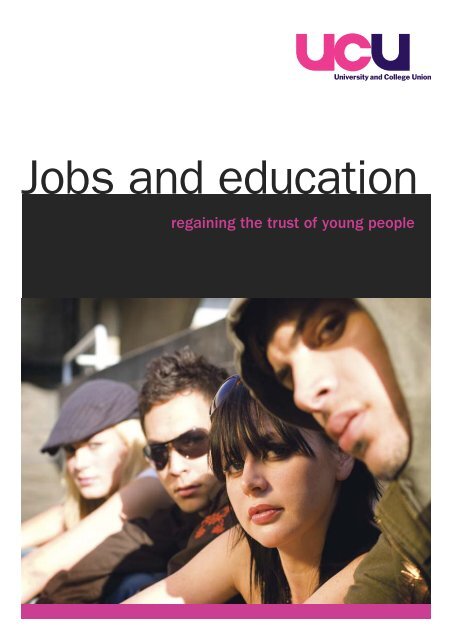
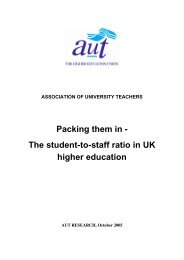
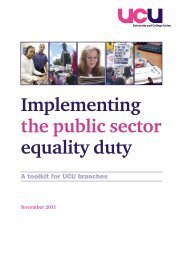
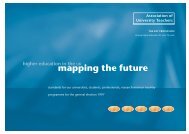
![(.pdf) [29kb] - UCU](https://img.yumpu.com/50914942/1/184x260/pdf-29kb-ucu.jpg?quality=85)
